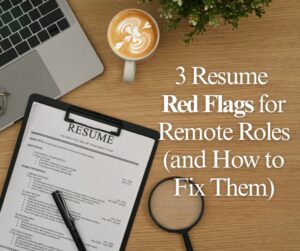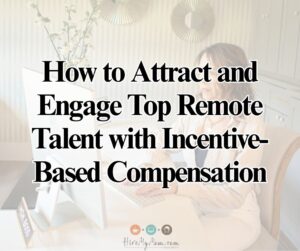Here’s How Moms Can Reenter the Workforce Remotely

If you’re trying to update your resume after time at home and feeling unsure where to begin, you’re not alone. Many moms returning to the workforce worry that their resume doesn’t reflect who they are now or what they’re capable of. That uncertainty often feels even heavier when you’re aiming for a remote role and don’t have recent paid experience to point to.
The good news is that reentering the workforce remotely doesn’t require a perfect resume, it requires clarity, confidence, and a different approach.
Career Pauses Are Normal, Not Career Killers
Taking time away from paid work to care for children is one of the most common reasons women pause their careers. Research from the Pew Research Center shows that caregiving responsibilities frequently shape mothers’ work histories, especially when children are young. This pattern is widespread and well understood, not a personal shortcoming. Understanding this helps reframe how you view your own resume. A career pause doesn’t erase skills, it simply changes how they were developed.
Employers increasingly expect to see non-linear work histories, which means your resume doesn’t need to “hide” a gap, it needs to explain your value.
Step 1: Ditch the Chronological Resume
Chronological resumes highlight dates first, which works against moms reentering the workforce. A hybrid resume is far more effective.
Structure it like this:
- Professional summary (2–3 sentences)
- Skills section
- Experience grouped by function, not timeline
Example summary: Detail-oriented professional reentering the workforce after a planned caregiving pause. Seeking a remote administrative or support role. Known for reliability, organization, and strong written communication.
This immediately reframes your background without apology.
Step 2: Translate Daily Responsibilities Into Job-Ready Skills
Remote employers hire based on execution. The same skills used to manage a household translate directly into remote work. Instead of vague traits, write skill sections that mirror job descriptions:
Administrative Support
- Managed calendars, schedules, and competing deadlines
- Organized digital files and tracked information accurately
- Coordinated logistics across multiple priorities
Communication
- Handled ongoing email correspondence and follow-ups
- Communicated clearly with schools, service providers, and organizations
- Resolved issues and ensured tasks were completed
This is how you make a resume readable to hiring managers.
Step 3: Reframe Experience Without Over-Explaining
Experience does not need to be paid or recent to be valid. Volunteer roles, school involvement, community leadership, freelance help, or assisting a small business all count. Use clear labels such as:
- Administrative Support (Independent)
- Volunteer Coordinator
- Operations Support
List responsibilities, not explanations. Employers care what you did, not why you were doing it.
Step 4: Create Recent Experience in 30 Days
If your resume feels thin, you can fix that quickly. Choose one:
- Complete a short course relevant to your target role
- Build a practice project (calendar system, inbox workflow, spreadsheet)
- Take on a small contract or one-off task
Add it as: Professional Development Currently completing training in [skill]
This shows momentum, which matters more than duration.
Step 5: Apply Where Reentry Is Expected
If you’re figuring out how to get a remote job after being a stay-at-home mom, start with roles that expect to train:
- Administrative or virtual assistant roles
- Customer or client support
- Scheduling or inbox management
- Operations support
Part-time remote roles are often the easiest entry point and frequently expand once trust is built.
Step 6: Address the Gap Once Then Move On
You only need one sentence: After a planned career pause to focus on family, I’m returning to the workforce and pursuing a remote role where I can contribute immediately.
No apologies. No long explanations.
Step 7: Apply Before You Feel Ready
Many moms delay applying because their resume doesn’t feel perfect. But perfection isn’t the hiring requirement, clarity is.
Your resume will evolve once you’re working again. That’s normal.
You’re not starting over. You’re restarting with skills, context, and experience, and remote work is built for exactly that. Apply to jobs today! Or if you need some extra help or encouragement to get your job search going, check out our Career Jumpstart Session or our Personal Career Strategist! We are here to help you succeed!









